Table of Contents
Tryptophan is the sole precursor of serotonin. L-Tryptophan’s role in brain serotonin synthesis is critical for mood, behavior and cognition.
Serotonin is often referred to as the “happiness molecule”. Low serotonin levels can result in pain, insomnia, depression, seasonal affective disorder, and chronic fatigue.
For your body to manufacture serotonin, it needs an adequate supply of the natural amino acid Tryptophan. As a nootropic supplement, Tryptophan is used for anxiety, ADHD, depression, insomnia, memory loss, pain, and eating disorders.[i]
A lack of bioavailable Tryptophan in your body can have a big impact on your life.
Tryptophan helps:
- Anxiety & Mood. Tryptophan is an essential amino acid needed to synthesize serotonin which plays a role in mood, sleep, learning and even appetite control.
- ADHD. Low levels of Tryptophan and serotonin imbalances in the brain are associated with ADHD. Studies have found that children with ADHD have 50% lower than average levels of Tryptophan.[ii]
- Neurotransmitters. Low levels of Tryptophan can result in short- and long-term memory loss. Supplementing with Tryptophan has been found to improve memory in healthy adults.
Overview
Tryptophan is an essential amino acid and precursor to serotonin, melatonin and niacin (Vitamin B3) in your body.
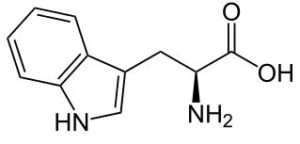
The enzyme Tryptophan hydroxylase converts Tryptophan into 5-HTP (5-hydroxytryptophan).
The decarboxylation of 5-HTP to serotonin is dependent on the presence of Vitamin B6, also called pyridoxal 5’-phosphate (P5P).
The further conversion of serotonin into melatonin requires the presence of SAM-e (S-Adenosyl-L-methionine).
Tryptophan is found in foods like oats, bananas, dried prunes, milk, tuna, cheese, bread, chicken, turkey, peanuts and chocolate.
Eating food containing Tryptophan will increase levels of this amino acid in your body. But not necessarily boost serotonin levels in your brain. Here’s why…
Tryptophan is one of 8 essential amino acids and has the lowest concentration in the body of all the amino acids. Tryptophan requires and competes for active transport to the brain. And competes for the same receptors as the other amino acids.
Research has also found that serotonin levels are enhanced by carbohydrates in your meals because insulin release accelerates the serum removal of some of the amino acids that Tryptophan is competing with.
And if your meal has a higher percentage of proteins, it also slows serotonin elevation in your brain.[iii]
Since Tryptophan from food has issues working its way to your brain to make serotonin, why not skip that step and supplement with 5-HTP instead? Tryptophan and 5-HTP both penetrate the blood-brain barrier. And 5-HTP is the intermediate step in serotonin synthesis.
See my post on 5-HTP for more on why supplementing with 5-HTP instead of Tryptophan is not such a good idea.
How does Tryptophan work in the Brain?
Tryptophan boosts brain health and function in several ways. But two in particular stand out.
- Tryptophan boosts memory. Tryptophan’s main nootropic mechanism of action is as a precursor to the neurotransmitter serotonin. Other neurotransmitters such as melatonin and beta-endorphin increase following Tryptophan supplementation.[iv]
Research shows that Tryptophan and serotonin play a significant role in memory. Enhanced brain serotonin has been shown to improve cognitive performance in animals and humans. And decreasing levels of serotonin through Tryptophan depletion impairs cognition.
A study done in Pakistan assessed memory in rats following Tryptophan administration. The rats received Tryptophan doses of 50 and 100 mg/kg of body weight for 6 weeks. The study showed significant improvement in memory of rats following both doses of Tryptophan.[v]
- Tryptophan enhances mood. As a precursor to serotonin, Tryptophan can have a significant effect on mood. Supplementing with Tryptophan has been found to increase not only serotonin, but growth hormone and prolactin as well.
Researchers infused 11 healthy male subjects with doses of 5, 7.5 and 10 grams of Tryptophan. And then monitored their hormonal and behavioral responses.
Tryptophan produced significant effects on mental and physical sedation but did not increase levels of tranquilization. Tryptophan provided a calming effect without knocking these guys out even at high doses.[vi]
How things go bad
As we get older, our brain chemistry and energy metabolism changes.
↓ Tryptophan levels decline
↓ Tryptophan hydroxylase levels decline
↑ Stress, insulin resistance and age increase
↓ Magnesium and Vitamin B6 levels decline
↓ Neurotransmitter levels decline
↓ Concentration, working memory and executive function decline
↓ Appetite regulation, energy and alertness decline
All of these changes can happen at an age. And are influenced by declining Tryptophan levels. Very little dietary Tryptophan is available for protein and serotonin synthesis. And for many people this can be a problem.
Anxiety, depression, ADHD, memory loss, binge eating and a host of other mental and physical issues have been correlated with low Tryptophan levels.
Tryptophan benefits
Just living in our modern society seems to leave us irritable, stressed-out, and anxious. Worst case is problems sleeping, depression, aggressive behavior, reduced motivation, pain and even suicidal thinking.
 And all have been traced to not enough serotonin in our brain.[vii]
And all have been traced to not enough serotonin in our brain.[vii]
Serotonin, the happiness molecule relies on an adequate supply of Tryptophan for synthesis. Researchers now recognize that the role serotonin plays in psychiatric and behavior disturbances comes from Tryptophan depletion.[viii]
Tryptophan hydroxylase is the rate-limiting enzyme needed for serotonin production. And is involved in the conversion of Tryptophan to 5-HTP (5-Hydroxytryptophan) needed to make serotonin.
This enzyme (Tryptophan hydroxylase) can be inhibited by stress, insulin resistance, magnesium or Vitamin B6 deficiency, or increasing age.
Tryptophan and 5-HTP can penetrate the blood-brain barrier. But Tryptophan requires active transport and competes for the same receptors with other amino acids including tyrosine, phenylalanine, valine, leucine, and isoleucine.[ix]
To complicate things even more, serotonin levels are enhanced by carbohydrates in our diet because insulin release accelerates serum removal of the amino acids competing for Tryptophan transport. And high levels of protein in our diet slows increase in serotonin.[x]
So now you know why it’s helpful to add supplemental L-Tryptophan to your nootropic stack.
How does Tryptophan feel?
Many try L-Tryptophan the first time to cure insomnia or as an alternative to prescription sleep meds.
Dosing L-Tryptophan in the evening will typically ensure you’ll feel great the next day. You should have more energy for working out.
Anxiety levels should decrease. Happiness levels should rise. Tryptophan could help with memory. Music will sound better. Feelings of self-esteem will improve.
Some neurohackers report being able to taper off prescription antidepressant meds by supplementing with L-Tryptophan.
Tryptophan Clinical Research
5-HTP and Tryptophan are natural alternatives for the treatment of depression. And often used as alternatives to prescription antidepressant treatments because they don’t come with the side effects associated with antidepressant drugs.
But as neurohackers we don’t have a lot of research to help us decide if supplementing with Tryptophan makes sense. (If we base our decisions on clinical trials).
Much of the research looks at finding out if low levels of Tryptophan are associated with depression and poor cognition. But there is very little clinical evidence that supplementing with Tryptophan will help reverse low Tryptophan levels. And if adding this nootropic to our stack will boost mood and cognition.
Researchers at the University of Queensland in Australia decided to comb through the research to find out if clinical trials supported the natural health claims of using 5-HTP and/or Tryptophan for depression.
The team located 108 trials of which only 2 studies involving a total of 64 people had sufficient data to qualify. The team concluded that the very limited data showed 5-HTP and Tryptophan better that placebo for alleviating depression. But that larger and more studies were needed before their widespread use could be recommended.[xi]
Low Tryptophan = Depression and Poor Cognition
20 patients in remission or partial remission from depression were studied in a double-blind, crossover design trial. Tryptophan was artificially depleted in these patients so scientists could look at the effects on cognition and mood.
The research team found what we see in real life. Lower levels of Tryptophan had a negative effect on mood, their ability to process positive information, and attention.[xii]
Tryptophan Helps Manage Depression
Serotonin has been recognized as the neurotransmitter that is key to managing depression for the last 30 years. Most of the prescription drug therapies for depression work by raising serotonin levels at the relevant synapses.
We also know that Tryptophan is the immediate precursor to serotonin in the brain. So researchers, using a “what came first, the chicken or the egg” approach decided to find out if low serotonin levels or low Tryptophan levels were to blame for depression symptoms.
Researchers in China analyzed levels of Tyrosine, Tryptophan and serotonin in patients with major depressive disorder. And found that all three were decreased in depressed patients. (Note that Tyrosine is a precursor to dopamine in the brain).[xiii]
The Center for Addiction and Health in Toronto conducted a randomized, double-blind, placebo-controlled trial with 30 depressed individuals. Treatment was fluoxetine (Prozac®) 20 mg per day, 2-4 grams of Tryptophan per day or a placebo for 8 weeks.
Mood was assessed using the Hamilton Depression Rating Scale and the Beck Depression Index during the trial. During the 1st week there was a significant decrease in depression in those who used fluoxetine or Tryptophan.
At 4 weeks the research team recorded a disruption in sleep patterns for those using fluoxetine or a placebo. But not the Tryptophan group.
The team concluded that combining 20 mg of fluoxetine with 2 g of Tryptophan was a safe protocol for treating depression. Patients experienced a rapid decrease in depressive symptoms. And the combination had a protective effect on sleep patterns.[xiv]
DO NOT TRY THIS AT HOME. The trials combining Tryptophan with SSRI’s, SNRI’s and MAOI’s are all done under professional supervision. But remember, Tryptophan is a precursor to serotonin. And antidepressant meds also boost serotonin in the brain. When combined, serotonin levels are boosted even more.
Herein lies the problem. If you increase serotonin too much, you put yourself in real danger of Serotonin Syndrome. Which can lead to all kinds of nasty side effects. Including death.[xv]
DO NOT combine Tryptophan with antidepressant meds unless you are doing so under the careful supervision of a doctor. It is much too dangerous attempting this on your own.
Tryptophan Boosts Exercise Performance
Ever wondered why you cut a workout session short even though physical fatigue wasn’t an issue? Researchers found it could be due to low Tryptophan levels. And its effects on serotonin in your brain.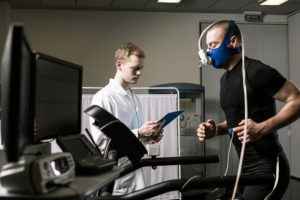
20 healthy young men aged 21 years used a cycle ergometer at about 50% of their physical capacity for 10 minutes followed by maximum intensity exercise for another 30 minutes. This sequence was repeated 3-times, and after the 4th series, each participant continued at the highest speed they could sustain for 20 minutes.
This protocol was performed twice: once with and once without Tryptophan. Researchers found peak power output during the last 20 minutes were higher on trials performed with Tryptophan than those who performed on a placebo.[xvi]
Another trial in Spain recruited 12 healthy sportsmen who ran on a treadmill until exhaustion. Once while supplementing with Tryptophan and once with a placebo.
Total exercise time, perceived exertion rate, maximum heart rate, peak oxygen consumption, pulse recovery rate, and excess post-exercise oxygen consumption were determined during the two trials.
Total exercise time was nearly 50% greater after receiving Tryptophan than after receiving a placebo. Perceived exertion rate was lower when using Tryptophan.
The researchers concluded that the longer exercise time could be due to increased pain tolerance as a result of Tryptophan supplementation.[xvii]
Tryptophan Relieves Symptoms of Seasonal Affective Disorder
Seasonal Affective Disorder (SAD) is a form of depression experienced by many during the winter months. Symptoms include difficulty waking, decreased energy, weight gain, carbohydrate craving, difficulty concentrating, decreased libido, withdrawal, anxiety, depression and irritability.
The first order of treatment is often light therapy. But many do not respond to light therapy typically because of a mutation in the melanopsin gene and the associated signaling pathway between the retina and the pineal gland.[xviii]
The pineal gland in your brain is your source of melatonin which influences sleep cycles. Melatonin is synthesized from serotonin which is synthesized from Tryptophan.[xix]
So if light therapy doesn’t work, possibly supplementing with Tryptophan to stimulate production of serotonin and melatonin could be effective.
Researchers at the University of British Columbia in Vancouver, Canada set out to find if Tryptophan could help those with Seasonal Affective Disorder (SAD) where light therapy failed.
Patients were treated for 2 weeks using light therapy. Those who did not respond to light therapy were treated with 1 g Tryptophan 3-times per day for 2 weeks while continuing light therapy.
The addition of Tryptophan resulted in a significant reduction in depression. 64% of the patients in this study showed very good clinical responses to the combined treatment with minimal side effects.[xx]
Tryptophan Recommended Dosage
Recommended dosage of Tryptophan is 500 – 1,000 mg per day for cognitive benefit.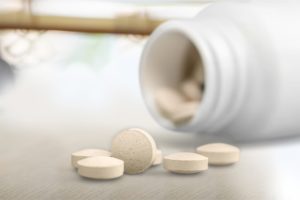
The University of Michigan Health Department recommends much higher doses for:
- Lowering appetite and cravings: .5 – 2 grams per day
- Depression or Anxiety: 2 – 6 grams per day (with medical supervision)
- Chronic pain or migraines: 2 – 4 grams per day in divided doses
- Sleep disorders or insomnia: 1 – 2 grams at bedtime[xxi]
Tryptophan is a precursor to the neurotransmitter serotonin in the brain. Tryptophan hydroxylase is the rate-limiting enzyme needed for serotonin production. And requires magnesium and Vitamin B6 to synthesize serotonin.
Tryptophan is also a precursor to the synthesis of Vitamin B3 (niacin). So if you don’t have enough niacin in your body, supplementing with L-Tryptophan will not efficiently produce serotonin because it’s being used to produce niacin. Which also depletes stores of the vitamin cofactors B1, B2 and B6.
So supplement L-Tryptophan with a B-Vitamin complex that includes Vitamins B3 and B6, and magnesium.
Note that some of the clinical trials used in this post use much higher doses of Tryptophan. Which is not recommended and usually not necessary.
Too much Tryptophan will make you sleepy. And could produce excess levels of 5-HTP and serotonin which can lead to Serotonin Syndrome.
Tryptophan Side Effects
Tryptophan is a normal part of your diet and considered non-toxic and safe at recommended doses.
But in the unlikely event that you already have adequate levels of Tryptophan in your body, supplementing with more could cause problems. As can dosing more that the recommended amount.
Tryptophan could cause stomach upset, loss of appetite, nausea, heartburn, drowsiness, headaches, dry mouth and sexual problems.
Start at the lowest dose to see how your body reacts. When first starting with L-Tryptophan take your dose in the evening to avoid possible drowsiness issues.
Caution: Low to moderate doses of Tryptophan (30 mg per pound of body weight), or about 4.5 grams for the average 165 lb. adult is considered safe and free of side effects. However, most don’t need to dose at nearly these levels.
DO NOT use L-Tryptophan if you are taking antidepressant medications including SSRI’s. Because these drugs delay normal degradation of serotonin in brain synapses leaving more serotonin circulating in your brain.
Too much Tryptophan in combination with these drugs can produce Serotonin Syndrome which can lead to delirium, involuntary muscle contractions, high fever, and coma. And worse case and a very real scenario is death.[xxii]
Type of Tryptophan to buy
L-Tryptophan is available in tablet and capsule form usually 500 – 1,000 mg.
You also get Tryptophan in foods you eat including chocolate, oats, bananas, dried dates, milk, cottage cheese, meat, fish, turkey, and peanuts.
Approximately 300 mg of Tryptophan is available in three ounces of turkey, lamb, beef, tuna, or peanuts. Fortunately, relative to other amino acids, small amounts are needed for a therapeutic effect.
And you get 200 mg L-Tryptophan in Click for Performance Lab® Sleep which also contains 100 mg magnesium (as Magnesium Bisglycinate, Magnesium Taurate, & NutriGenesis® Magnesium) and 500 mg Montmorency Tart Cherry (as CherryPURE®).
But there are all kinds of reasons why your body may not be making good use of the Tryptophan you’re getting from food. See “Tryptophan Benefits” for more on why it may be a good idea for you add Tryptophan to your stack.
Nootropics Expert Recommendation
Tryptophan 500 – 1,000 mg per day
 I recommend using Tryptophan as a nootropic supplement.
I recommend using Tryptophan as a nootropic supplement.
Your body does get some Tryptophan from the food you eat. But this amino acid is competing with other amino acids for transport to your brain. It’s competing for the same receptors. And carbohydrates vs. proteins in your meals can affect Tryptophan’s ability to synthesize serotonin in your brain.
Supplementing with L-Tryptophan will make more of this amino acid available to synthesize serotonin and melatonin.
L-Tryptophan is especially helpful for those with low serotonin levels. Boosting this crucial neurotransmitter can help alleviate insomnia, pain, depression and anxiety.
Start with 500 mg of L-Tryptophan per day and take it in the evening. See how your body reacts and how you feel the next day. Increase the dose to no more than 2 grams per day as needed. And watch for side effects.
L-Tryptophan requires adequate levels of Vitamin B3, B6 and magnesium for serotonin synthesis. So add a good B-Complex vitamin and magnesium to your stack when using L-Tryptophan.
And if you’re dealing with insomnia, consider trying Click for Performance Lab® Sleep

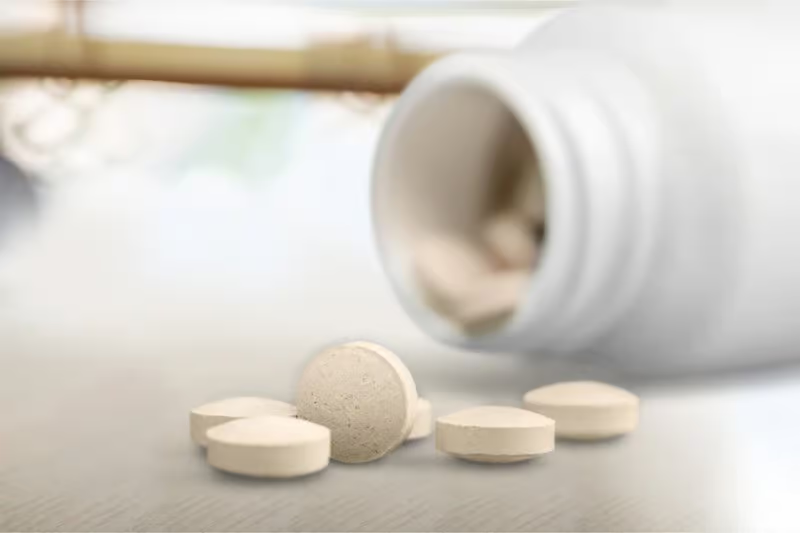
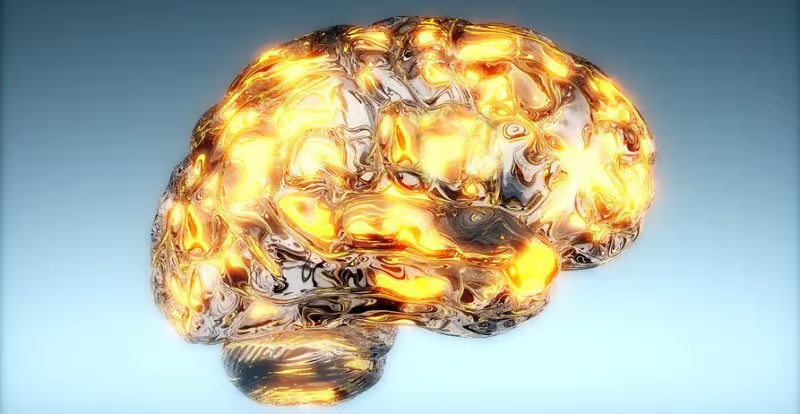






Join The Discussion - 388 comments
amindQS
July 25, 2022
Good evening David, is a 500mg dose of tryptophan enough to raise serotonin?
David Tomen
July 26, 2022
Yes, 500 mg is enough for most people.
Cine
July 24, 2022
Hi David,
I take 18.5 mg of IMMEDIATE release Venlafaxine at 8am & 1pm, followed by 25 mg of EXTENDED release Venlafaxine at 6pm everyday.
I am thinking of adding 50-100mg of L-tryptophan at 8am along with 18.5mg of Venlafaxine. As I taper the 8am Venlafaxine, I’ll increase the tryptophan. Once the 8am dose of venlafaxine is replaced by tryptophan, then do the same for 1pm one.
Any thoughts or recommendations on this matter?
Thanks!
David Tomen
July 24, 2022
Cine, do NOT combine Tryptophan with venlafaxine or you will very likely end up with Serotonin Syndrome which can be deadly.
Cine
July 25, 2022
What if I take 37.5 mg Immediate release at 8am, wait for 6 hours then take tryptophan by itself at 2pm. Then 6 hours later take 25mg of venlafaxine at 8pm.
Do you do counciling for antidepressant tapering?
David Tomen
July 26, 2022
Cine, the half-life of venlafaxine is 7.5 – 12 hours. There is no safe dose of L-Tryptophan as long as you are using that drug.
I have done Personal Consultations with many who are looking for a natural alternative for dealing with depression and/or anxiety.
Nike
July 14, 2022
Hello David,
I would like to ask you the following quick questions and your advice will be highly appreciated.
1. Can I take L-Tryptophan 500 mg with Magnesium and B6 vitamin together? Magnesium doesn’t interact with absorption of Tryptophan like other amino acids do?
2. Do you recommend to take L-Tyrosine with Tryptophan or L-Dopa (Mucuna Prurians)? In Europe I can find only one brand which does Mucuna Prurians and I am putting the link of it. It contains only 15% of L-Dopa.
Solaray DopaBean (Amazon)
Thanks a lot for your help.
David Tomen
July 15, 2022
Nike, L-Tryptophan is usually used before bed because it increases serotonin and then melatonin. Magnesium acts as a cofactor in the synthesis of serotonin. So yes, they can be used together.
I recommend using L-Tyrosine to raise dopamine during the day rather than L-DOPA. It’s very effective and easier to get the dose right.
Rather than using an isolated Vitamin B6 I highly recommend using a BioActive B-Complex instead. Because the B-Vitamins work in synergy. Using only B6 but not B9 or B12 will increase your homocysteine levels. Which you want to avoid.
But make sure it is bioactive and not a synthetic. It must contain “methylfolate” instead of folic acid. And it must contain methylcobalamin instead of cyanocobalamin.
Nike
July 23, 2022
Thanks a lot David for your helpful advice; I really appreciate it a lot.
Just I would like to ask you for one more advice.
My L-Tryptophan supplement contains for each 500 mg of Tryptophan 0,7 mg of Vitamin B6. So it should be enough for absorption of the amino acid? Or do you recommend taking in addition to it Vitamin B complex with all eight vitamins?
And if you do recommend taking apart of my Tryptophan supplement Vitamin B complex, please let me know what is the best timing to take Vitamin B complex as I am not sure if they interact with sleeping.
So your advice will be highly appreciated.
David Tomen
July 23, 2022
Nike, I am not a fan of using isolated B-Vitamins because for serotonin synthesis you also need magnesium, Vitamin D, Omega-3s, and Vitamins B9 & B12.
Nike
July 24, 2022
Ok I got it. So it’s better to take good multivitamine.
And do you rececomend to take it in the morning or I should take them whenber I take Tryptophan?
Thanks for your advice.
David Tomen
July 24, 2022
Daily use of a bioactive multi in the morning will optimize your vitamin and minerals levels. Your system will use those nutrients as cofactors when needed.
Nike
July 30, 2022
Hello David,
I got one quick question and would like to ask you an advice.
I tried 1000 mg Tryptophan last night and worked much better than 500 mg.
Do you recommend to take 500 mg @ night and 500 mg during the day or is it better to take 1000 mg just before going to bed around 1 h before?
Thanks David.
David Tomen
August 2, 2022
Nike, if 1,000 mg worked for you before bed then continue using it like you have.
Sam
July 8, 2022
David: Thanks you for all of your contributions. I would like to start supplementing with tryptophan, however, I ran in to some slightly concerning information regarding tryptophan being linked to cancer. Do you have any thoughts? Here is some text from the website:
“The inflammatory nature of several of the breakdown substances of L-tryptophan, leads to one of the worst direct tryptophan side effects: the causation and promotion of cancer.
In the 1950s researchers demonstrated that specific metabolic tryptophan adducts and the addition of “unnatural” DL-tryptophan to the diet of test subjects cause bladder cancer in animals (Dunning, et al., 1950; Pipkin, et al., 1969). In other experiments the same cancer-causing tryptophan breakdown compounds were recovered after adding the “natural” L-tryptophan (Brown & Price, 1956).
At least some of these catabolic substances are highly mutagenic and, as mentioned, can induce liver cancer (Nemoto, et al., 1979; Yamazoe, et al., 1980 & 1981; Ashida, et al., 1998; Suzuki, et al., 2008). Certain tryptophan degradation substances can also form carcinogenic nitrosamines which have been shown to cause bladder cancer, including in humans (Cohen, et al., 1979; Watanabe, et al., 1979; Ohta, et al., 1983; Abdel-Tawab, et al., 1986; Watanabe, 1997; Chung & Gadupudi, 2011). Tryptophan metabolites are also involved in other types of cancers such as cervical cancer (Fotopoulou, et al., 2011).”
David Tomen
July 8, 2022
Sam, anything that I have seen recently does NOT show a association with Tryptophan and cancer. A lot of research has been conducted on Tryptophan metabolism and other diseases. But I think this author sums it up well, “Here we must emphasize that despite the large number of recognized genetic alterations, the number of firmly established causal relations with specific diseases is still small.” (https://pubmed.ncbi.nlm.nih.gov/29807576/)
yap wein fook
June 22, 2022
Hallo david
I was suffering Tinnitus right ear/ vertibular neusritis. And some pangasritis i on ppi meds omeprazole now. I got anxiety somehow can’t sleep.
How i can supply l trytophan l tyrosine with short term? Full benefit And whichs day i can stop. Or cycle it.
I got 500mg. Other one is same 500mg. Need safety route. I need some helping.
David Tomen
June 22, 2022
Both of those supplements have a short half-life. So the L-Tyrosine you take at 8 am is gone by noon. Same with L-Tryptophan. Use L-Tyrosine 500 mg twice per day. And 500 mg L-Tryptophan before bed. There is no need to cycle them.
Monica
June 1, 2022
Hi David, I’m currently taking N-Acetyl L-Tyrosine and Tryptophan along with L glutamine, American ginseng and performance lab multi.
Im taking NALT in the morning when I wake up with ginseng, performance lab and glutamine and Tryptophan at bedtime again with perforce lab but I’m not sure about dosing since I want to maintain serotonin/dopamine balance.
The Nalt is 350mg and tryptophan 500mg. How much should I be taking of each? I prefer taking Nalt just one dose in the morning because during the day it makes it harder for me to take it with an empty stomach since my eating schedule varies a lot. Is it ok to take 700mg of Nalt in the morning and 1000 tryptophan at bedtime?
I am also adding sulbutiamine and l cysteine I just bought from double wood but I’m still waiting for it to arrive. Is this a good mix with the rest?
Thanks
David Tomen
June 4, 2022
Monica, I include recommended dosages for each supplement I’ve reviewed so please find those on this site (https://nootropicsexpert.com/nootropics-list/).
NALT has a short half-life so what you take at 8 am is gone by noon and can no longer make dopamine. Use 350 mg NALT morning and noon. And 500 mg L-Tryptophan before bed. And dopamine and serotonin should stay in balance.
And do NOT worry about this “empty stomach” or “take it with a meal” thing.
Monica
June 6, 2022
Thank you! I thought they had to be taken with an empty stomach or I wouldn’t absorb them if taken with food. I’m always confused and preoccupied by that as I want to give everything the best chance to work.
Am I supposed to feel a difference as soon as I start taking them or will the effects get better with time as they build up on my system?
Thanks for your help
David Tomen
June 6, 2022
You should feel a ‘difference’ within the first couple of days. But it will likely take consistent daily use for 2 – 3 weeks to get the full benefit. And by then you’ll likely have forgotten what it felt like before because you’ll get used to a ‘new normal’ of feeling better.
Marianne
May 17, 2022
Hi David, do we develop a tolerance for tryptophan? It used to work so well for me–now the effectiveness varies. First I take .5 mg melatonin a few hours before bedtime, then 1,000 mg tryptophan within an hour of bedtime, and in the morning I take 500 mg tyrosine. Would it help to cycle the tryptophan? Thanks!
David Tomen
May 18, 2022
Marianne, when you use that much Tryptophan you are very likely upsetting your serotonin/dopamine balance. Try using 500 mg L-Tyrosine morning AND noon and see if that helps.
Sandra
May 6, 2022
Hi David! I would like to optimize my breakfast for energy. Today I ate 300g of salmon only and felt extreme fatigue due to possibly insulin spike from excess protein. Some neurohacker on reddit linked this
https://pubmed.ncbi.nlm.nih.gov/34865076/
And proposed to eat additional Leucine with every protein meal to avoid tryptophan absorption (and to some degree minimise fatiuge after protein meals) Would it work?
Thank you!
David Tomen
May 7, 2022
Sandra, I do not think additional leucine will help you. And here’s why. This is a breakdown of the 11 amino acids found in cooked wild Atlantic salmon: https://tools.myfooddata.com/protein-calculator/171998-173683/wt9-wt1/1-1
As you can see it contains a well balanced amino acid profile with Phenylalanine and Tyrosine compared to Tryptophan. So you have a much higher amount of dopamine vs serotonin producing amino acids.
This does not look like a “spike of excess protein” from what I can tell. This could be a case a ‘insulin resistance’ instead. You would counter that by supplementing with Berberine.
Mind you this is purely an educated guess on my part. But hopefully it’ll give you another way to look at this.